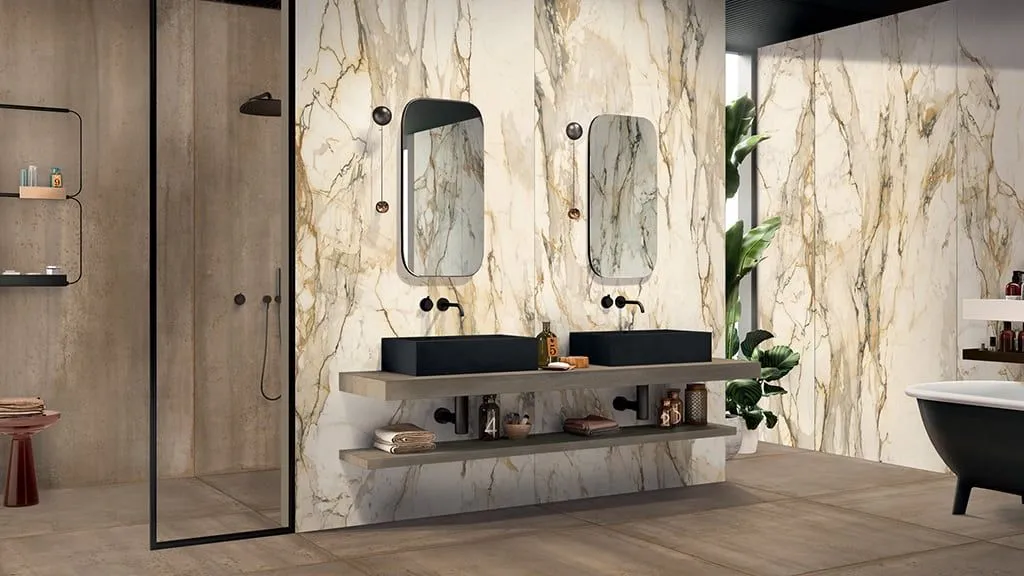Porcelain worktops have become increasingly popular due to their numerous advantages over quartz. Here are 30 reasons why porcelain worktops can be considered better:
- Heat resistance: Porcelain is more resistant to high temperatures, making it ideal for kitchen surfaces exposed to hot pots and pans.
- Scratch resistance: Porcelain is harder and more scratch-resistant than quartz, helping it maintain its appearance over time.
- Durability: Porcelain is incredibly tough and less prone to cracking or chipping compared to quartz.
- UV resistance: Porcelain is fully UV-resistant, ensuring it won't fade or discolor in direct sunlight, unlike some quartz.
- Wide range of finishes: Porcelain comes in a variety of textures, such as matte, gloss, and satin, providing more design options.
- Variety of colors: It offers a wider color palette, with some slabs mimicking natural stone more convincingly than quartz.
- Non-porous: Like quartz, porcelain is non-porous, meaning it won’t absorb liquids, leading to easier cleaning and stain prevention.
- Hygienic: Its non-porous nature makes it more hygienic, as it doesn’t harbor bacteria or mold.
- Chemical resistance: Porcelain resists chemical damage better than quartz, including harsh cleaning agents.
- Lightweight: Porcelain is generally thinner and lighter, which can be easier for installation.
- Thin profiles: It can be produced in thinner slabs without compromising strength, making it suitable for minimalist designs.
- Eco-friendly: Porcelain is made from natural materials and often has a lower environmental impact during production compared to quartz.
- Waterproof: It’s fully waterproof, making it ideal for kitchens and bathrooms where moisture is prevalent.
- Impact resistance: Porcelain worktops are highly resistant to impacts, such as heavy objects being dropped.
- Seamless design: Large porcelain slabs can reduce the need for visible seams, creating a more seamless appearance.
- Flexibility in design: Porcelain can be printed with digital technology to mimic other materials like marble, wood, or metal.
- Easy maintenance: Porcelain requires little maintenance and doesn’t need sealing like quartz sometimes does.
- Food-safe: The material is food-safe and does not react with acidic or alkaline foods.
- Consistent appearance: Unlike quartz, which can have visible resin patches, porcelain’s surface remains more uniform.
- Resistant to thermal shock: Porcelain is more resistant to thermal shock, preventing cracks from sudden temperature changes.
- Versatile installation: It can be used not only on countertops but also as backsplashes, walls, and flooring.
- Sustainable production: Many porcelain manufacturers focus on sustainable production practices.
- High strength-to-weight ratio: Despite being thin, porcelain offers exceptional strength, especially compared to thicker quartz slabs.
- Customization options: Porcelain can be cut into different shapes, offering more creative design possibilities.
- Resistance to fading: Porcelain worktops do not lose their color over time, ensuring long-lasting beauty.
- Affordable options: While both can be premium, porcelain often has more affordable options than quartz.
- Resistant to burn marks: Hot objects won’t leave burn marks on porcelain surfaces.
- Better for outdoor use: Porcelain can be used outdoors due to its weather resistance, unlike most quartz which is prone to UV damage.
- Elegant aesthetics: Porcelain worktops can achieve a sleek, high-end look, often emulating marble more convincingly than quartz.
- Long-term value: Due to their resilience and aesthetic versatility, porcelain worktops can add long-lasting value to any home.


